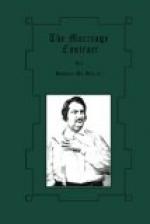“She is so kind and so devoted; she has always paid Natalie’s debts during the three months she spent with us every year in Paris.”
“She could well afford to do so, for she gets her living out of Lanstrac,” said Mathias. “She! grown economical! what a miracle! I am told she has just bought the domain of Grainrouge between Lanstrac and Grassol; so that if the Lanstrac avenue were extended to the high-road, you would drive four and a half miles through your own property to reach the house. She paid one hundred thousand francs down for Grainrouge.”
“She is as handsome as ever,” said Paul; “country life preserves her freshness; I don’t mean to go to Lanstrac and bid her good-bye; her heart would bleed for me too much.”
“You would go in vain; she is now in Paris. She probably arrived there as you left.”
“No doubt she had heard of the sale of my property and came to help me. I have no complaint to make of life, Mathias. I am truly loved, —as much as any man ever could be here below; beloved by two women who outdo each other in devotion; they are even jealous of each other; the daughter blames the mother for loving me too much, and the mother reproaches the daughter for what she calls her dissipations. I may say that this great affection has been my ruin. How could I fail to satisfy even the slightest caprice of a loving wife? Impossible to restrain myself! Neither could I accept any sacrifice on her part. We might certainly, as you say, live at Lanstrac, save my income, and part with her diamonds, but I would rather go to India and work for a fortune than tear my Natalie from the life she enjoys. So it was I who proposed the separation as to property. Women are angels who ought not to be mixed up in the sordid interests of life.”
Old Mathias listened in doubt and amazement.
“You have no children, I think,” he said.
“Fortunately, none,” replied Paul.
“That is not my idea of marriage,” remarked the old notary, naively. “A wife ought, in my opinion, to share the good and evil fortunes of her husband. I have heard that young married people who love like lovers, do not want children? Is pleasure the only object of marriage? I say that object should be the joys of family. Moreover, in this case —I am afraid you will think me too much of notary—your marriage contract made it incumbent upon you to have a son. Yes, monsieur le comte, you ought to have had at once a male heir to consolidate that entail. Why not? Madame Evangelista was strong and healthy; she had nothing to fear in maternity. You will tell me, perhaps, that these are the old-fashioned notions of our ancestors. But in those noble families, Monsieur le comte, the legitimate wife thought it her duty to bear children and bring them up nobly; as the Duchesse de Sully, the wife of the great Sully, said, a wife is not an instrument of pleasure, but the honor and virtue of her household.”




